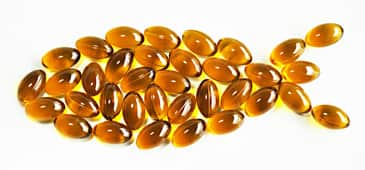
What's Hot
What's Hot
News flashes are posted here frequently to keep you up-to-date with the latest advances in health and longevity. We have an unparalleled track record of breaking stories about life extension advances.
Omega-3 supplementation associated with improved memory function in older adults
 February 29 2016. Results of a study published on February 10, 2016 in the Journal of Alzheimer's Disease indicate a memory-enhancing benefit for omega-3 fatty acids among older men and women.
February 29 2016. Results of a study published on February 10, 2016 in the Journal of Alzheimer's Disease indicate a memory-enhancing benefit for omega-3 fatty acids among older men and women.
The study utilized data from a previously reported double-blind trial involving healthy men and women between the ages of 50 and 80 years who received 2,200 milligrams per day long-chain omega-3 polyunsaturated fatty acids or a placebo daily for 26 weeks. The 44 subjects included in the current investigation received tests that assessed object location memory before and after the treatment period.
At the end of the study, red blood cell membrane proportions of omega-3 fatty acids were significantly higher in the treatment group compared with those who received a placebo. While object location recall performance at the beginning of the study was comparable, omega-3 supplemented participants experienced an average improvement of 13.2% versus 3.5% in the placebo group.
As possible mechanisms, authors Nadine Külzow and her associates suggest omega-3's effects on nerve cell membranes, new synapse formation and synaptic transmission that modulate the function and expression of receptors involved in memory and learning.
"Taken together, the results of this double-blind placebo-controlled proof-of-concept study provide experimental evidence that long-chain omega-3 fatty acids exert positive effects on memory functions in healthy older adults," the authors conclude. "Given that nutritional interventions are a cost-effective, well-tolerated, and safe approach that can thus be employed years or even decades before onset of pathological aging, our results support further large, long-term randomized controlled trials with sensitive outcome measures to determine the impact of long-chain omega-3 fatty acids on cognitive functions in healthy populations."
—D Dye
Longevity-linked protein discovered
 February 26 2016. An article published online on February 25, 2016 in Cell Reports reveals the discovery of researchers at the Sanford Burnham Prebys Medical Discovery Institute of a life-extending protein in the roundworm C. elegans. "We found that longevity can be extended by increasing the amount of a protein called arginine kinase-1 (ARGK-1)," reported lead author Philip McQuary, PhD, of the laboratory of Malene Hansen, PhD. "Arginine-kinase-1 maintains ATP availability within cells, and we suspect that increased levels trigger a fuel sensor, regulating energy homeostasis and extending lifespan."
February 26 2016. An article published online on February 25, 2016 in Cell Reports reveals the discovery of researchers at the Sanford Burnham Prebys Medical Discovery Institute of a life-extending protein in the roundworm C. elegans. "We found that longevity can be extended by increasing the amount of a protein called arginine kinase-1 (ARGK-1)," reported lead author Philip McQuary, PhD, of the laboratory of Malene Hansen, PhD. "Arginine-kinase-1 maintains ATP availability within cells, and we suspect that increased levels trigger a fuel sensor, regulating energy homeostasis and extending lifespan."
The team compared normal worms to longer-living worms lacking the protein S6 kinase. Reduction of S6 kinase also has been found to extend life in mice and other organisms. "ARGK-1 caught our attention because levels in S6K mutant worms were more than 30 times higher compared to normal worms," Dr McQuary stated. "When we created normal worms that overexpressed ARGK-1, they also lived significantly longer, meaning that ARGK-1 on its own can extend life."
The enzymes ARGK-1 and creatine kinase (ARGK-1's mammalian equivalent) transport energy to different locations within cells. In mice, brain creatine kinase levels are increased in those that lack a similar S6K protein as that which occurs in worms. "Interestingly, supplements with creatine, the substrate for creatine kinase, have been found to improve health and longevity in mice and possibly provide beneficial effects to humans with Parkinson's disease, suggesting a potential role for these enzymes in aging and age-related diseases," Dr McQuary noted.
"Sorting out which cell functions are protected will be crucial for understanding exactly how ARGK-1 supports longevity in C. elegans, and potentially in other organisms as well," he added.
Dr Hansen concluded that "Further work to understand the relationship between creatine kinase and S6K may lead to new avenues to pursue novel drugs for age-related diseases, including cancer."
—D Dye
Omega-3 supplementation associated with decreased breast density in obese women
 February 24 2016. Findings from a clinical trial reported in the April 2016 issue of the journal Cancer Prevention Research indicate an association between supplementation with omega-3 polyunsaturated fatty acids by obese women and a reduction in breast density.
February 24 2016. Findings from a clinical trial reported in the April 2016 issue of the journal Cancer Prevention Research indicate an association between supplementation with omega-3 polyunsaturated fatty acids by obese women and a reduction in breast density.
"The higher the breast density, the more likely the woman will develop breast cancer," explained lead researcher Andrea Manni of Hershey Medical Center in Hershey, Pennsylvania.
Dr Manni and colleagues randomized 266 postmenopausal normal weight, overweight and obese women to receive a 30 milligram (mg) dose of the antiestrogen drug raloxifene, 60 mg raloxifene, fish oil sourced omega-3 fatty acids EPA and DHA, 30 mg raloxifene plus omega-3, or no treatment daily for two years. Breast density and plasma omega-3 fatty acid levels were assessed at the beginning and end of the trial.
At the trial's conclusion, obese participants with elevated levels of DHA experienced a reduction in breast density, which Dr Manni suggests was due to a decrease in inflammation. The finding could help explain the varying results of studies that evaluated omega-3's protective effect against breast cancer, since women of normal weight have less inflammation and would therefore experience less benefit. "Omega-3 fatty acids have an anti-inflammatory effect, so that's one of the reasons why we suspected it may be particularly effective in obese women," stated Dr Manni, who is a professor and division chief of endocrinology, diabetes and metabolism at Penn State College of Medicine.
"The finding supports the idea that omega-3s, and specifically DHA, are preferentially protective in obese postmenopausal women," Dr Manni concluded. "This represents an example of a personalized approach to breast cancer prevention."
The researchers plan to evaluate the effect of DHA alone a future trial of obese women.
—D Dye
European vitamin deficiency pandemic
 February 22 2016. An article published online on February 10 2016 in the American Journal of Clinical Nutrition asks whether vitamin D deficiency in Europe is pandemic, then proceeds to submit enough evidence to confirm just that.
February 22 2016. An article published online on February 10 2016 in the American Journal of Clinical Nutrition asks whether vitamin D deficiency in Europe is pandemic, then proceeds to submit enough evidence to confirm just that.
A team from European countries and the U.S. combined data from 18 population studies involving a total of 55,844 subjects for their research. Fourteen of the studies had data concerning serum 25-hydroxyvitamin D [25(OH)D] levels that had not yet been standardized according to Vitamin D Standardization Program protocols applied by the researchers involved in the current investigation.
Using a value of less than 12 nanograms per milliliter (30 nmol/L), 13% of the European population examined had levels indicative of deficiency. Darker skinned individuals had a prevalence of deficiency that was three or more times greater than that of Caucasians. When a value of 20 nanograms per milliliter was used (50 nmol/L), deficiency was uncovered in 40.4%.
"The present work, which is the first to report to our knowledge the prevalence estimates of vitamin D deficiency based on standardized serum 25(OH)D data, suggests that vitamin D deficiency is widespread across Europe and at prevalence rates that meet the criteria of a pandemic (definition of a pandemic: 'an epidemic occurring worldwide, or over a very wide area, crossing international boundaries and usually affecting a large number of people,')" authors Kevin D. Cashman and colleagues announce.
"Although there have been some guidelines on sun exposure, the question of whether a minimal-risk approach to UV-B exposure would enable vitamin D production without increasing the risk of skin cancer is still outstanding," they write. "It is the view of this consortium that these factors reemphasize the need for public health strategies to explore food based solutions for prevention of vitamin D deficiency."
—D Dye
Meta-analysis affirms benefit for ginseng in type 2 diabetics
 February 19 2016. The February 2016 issue of the journal Medicine published the results of a meta-analysis conducted by researchers at China's Zhejiang University which add evidence to a beneficial effect for ginseng in men and women with impaired glucose tolerance or type 2 diabetes.
February 19 2016. The February 2016 issue of the journal Medicine published the results of a meta-analysis conducted by researchers at China's Zhejiang University which add evidence to a beneficial effect for ginseng in men and women with impaired glucose tolerance or type 2 diabetes.
For their research, Yun-mei Yang and colleagues selected eight trials that included 195 participants treated with ginseng and an equal number of control subjects. The analysis revealed improvements in fasting glucose, post-meal insulin levels and insulin resistance, as well as a reduction in triglycerides, and total and low-density lipoprotein (LDL) cholesterol among ginseng-treated subjects.
"The present meta-analysis is the first updated review to evaluate the efficacy of ginseng-related therapy in patients with type 2 diabetes or glucose intolerance," the authors announce. "Furthermore, our results demonstrate for the first time, an improved lipid profile (triglycerides, total cholesterol, and LDL) associated with ginseng-related therapy in patients with type 2 diabetes mellitus or impaired glucose tolerance. Moreover, ginseng-related therapy was more effective in terms of hemoglobin A1c and fasting glucose levels, in drug naïve participants than those taking antidiabetic medications, probably due to the masking of the effect of ginseng by antidiabetic medications."
As possible mechanisms for ginseng, Dr Yang and colleagues suggest modulations of insulin production and secretion, glucose metabolism, glucose uptake and inflammation, and activation of the AMPK –activated protein kinase pathway. Their research suggests that ginseng may be more beneficial for patients who have not started antidiabetic drug therapies than those already being treated.
"The present results establish the benefit of ginseng supplementation in improving glucose control and insulin sensitivity in patients with type 2 diabetes mellitus or impaired glucose intolerance," they conclude.
—D Dye
Researchers conclude testosterone improves sexual function in men 65 years of age and older
 February 17 2016. Results of trials reported in the February 18, 2016 issue of the New England Journal of Medicine reveal improvements in mood and sexual function in men over the age of 65 years who were treated with testosterone.
February 17 2016. Results of trials reported in the February 18, 2016 issue of the New England Journal of Medicine reveal improvements in mood and sexual function in men over the age of 65 years who were treated with testosterone.
"There appears to be benefits for treatment with testosterone among men who have unequivocally low levels of testosterone that are attributable solely to age," stated study coauthor Thomas Gill, MD, who is a Humana Foundation Professor of Medicine. "The benefits were quite convincing for sexual function."
The Testosterone Trials (TTrials), led by the University of Pennsylvania, enrolled 790 men at 12 sites. Men in each trial received testosterone gel or a placebo and were evaluated before and after a year of treatment. For the current investigation, the researchers examined the findings of three trials that separately evaluated vitality, and sexual and physical function.
In the Sexual Function Trial, testosterone replacement was associated with significant improvement in activity, desire and erectile function, and in the Vitality Trial, testosterone-supplemented men experienced better mood and less depression. Men in the Physical Function Trial who received testosterone reported improvement in walking that was not significantly different than that reported by the placebo group, however, when men in the three trials were combined, improvement was found to be 7.9% higher.
"These initial results from the TTrials show some benefit from testosterone treatments in older men who have low testosterone levels," concluded coauthor Ronald Swerdloff, MD. "While these initial findings are encouraging for men with low testosterone levels, the TTrials will continue to analyze the data to determine whether testosterone treatment improves cognitive function, bone density, cardiovascular health and anemia, as well as the risks of testosterone treatment."
—D Dye
Research contributes to the understanding of how leafy vegetables support beneficial bacteria
 February 15 2016. An article reported on February 15, 2016 in Nature Chemical Biology reveals the discovery of Spencer Williams of the University of Melbourne and colleagues of an enzyme needed by beneficial bacteria in order to feed on a sugar known as sulfoquinovose (SQ), which is abundantly produced by leafy, green vegetables. "We discovered the enzyme YihQ, which is used by bacteria to absorb and metabolize these sulfur-containing sugars as food," explained Dr Williams. "Sulfur is critical for building proteins, the essential components of all living organisms. Sulfoquinovose is the only sugar molecule which contains sulfur, and 'digestion' of the molecule by bacteria releases sulfur into the environment, where it re-enters the global 'sulfur cycle' to be reused by other organisms."
February 15 2016. An article reported on February 15, 2016 in Nature Chemical Biology reveals the discovery of Spencer Williams of the University of Melbourne and colleagues of an enzyme needed by beneficial bacteria in order to feed on a sugar known as sulfoquinovose (SQ), which is abundantly produced by leafy, green vegetables. "We discovered the enzyme YihQ, which is used by bacteria to absorb and metabolize these sulfur-containing sugars as food," explained Dr Williams. "Sulfur is critical for building proteins, the essential components of all living organisms. Sulfoquinovose is the only sugar molecule which contains sulfur, and 'digestion' of the molecule by bacteria releases sulfur into the environment, where it re-enters the global 'sulfur cycle' to be reused by other organisms."
"This work answers a 50-year mystery that has surrounded how sulfur--an element essential for life on Earth--was used and recycled by living organisms," he announced.
"Bacteria in the gut, such as crucial protective strains of E. coli, use SQ as a source of energy," added coauthor Ethan Goddard-Borger of the Walter and Eliza Hall Institute. "E. coli provides a protective barrier that prevents growth and colonization by bad bacteria, because the good bugs are taking up all the habitable real estate."
"We speculate that consumption of this specific molecule within leafy greens will prove to be an important factor in improving and maintaining healthy gut bacteria and good digestive health."
"New antimicrobial strategies are desperately needed as more and more bacteria acquire resistance to existing classes of antibiotics," he noted."We think it will be possible to use these widespread enzymes to enable highly specific delivery of antibiotics to harmful forms of E. coli and other pathogens, such as Salmonella, responsible for food poisoning, while leaving the good gut bacteria untouched."
—D Dye
Nutrients affect gene behavior
 February 12 2016. An article published online on February 1, 2016 in the journal Nature Microbiology reveals that genes not only influence metabolism but that metabolic byproducts influence the behavior of genes as well.
February 12 2016. An article published online on February 1, 2016 in the journal Nature Microbiology reveals that genes not only influence metabolism but that metabolic byproducts influence the behavior of genes as well.
"The classical view is that genes control how nutrients are broken down into important molecules, but we've shown that the opposite is true, too: how the nutrients break down affects how our genes behave," stated lead researcher Markus Ralser of the University of Cambridge and London's Francis Crick Institute.
Previous research findings suggested that biochemical reactions occurring within an organism can affect gene regulation. These reactions depend on available nutrients, including sugars, amino acids, fatty acids and vitamins derived from food. By manipulating the levels of metabolites in Saccharomyces cerevisiae (yeast) cells, Dr Ralser and colleagues found that nearly nine out of ten genes and their products were affected by the changes. "Cellular metabolism plays a far more dynamic role in the cells than we previously thought," Dr Ralser explained. "Nearly all of a cell's genes are influenced by changes to the nutrients they have access to. In fact, in many cases the effects were so strong, that changing a cell's metabolic profile could make some of its genes behave in a completely different manner."
"Another important aspect of our findings is a practical one for scientists," he added. "Biological experiments are often not reproducible between laboratories and we often blame sloppy researchers for that. It appears however, that small metabolic differences can change the outcomes of the experiments. We need to establish new laboratory procedures that control better for differences in metabolism. This will help us to design better and more reliable experiments."
—D Dye
Metformin may aid heart attack recovery
 February 10 2016. On February 9, 2016, the journal Cardiovascular Diabetology published the results of research conducted by Jolanta Weaver at Newcastle University and colleagues which provides evidence for a benefit for the diabetes drug metformin in heart attack recovery among diabetic patients. Use of metformin has been associated with a reduction in the incidence of cardiovascular disease in trials involving subjects with type-2 diabetes, however, its protective mechanism had until now remained undefined.
February 10 2016. On February 9, 2016, the journal Cardiovascular Diabetology published the results of research conducted by Jolanta Weaver at Newcastle University and colleagues which provides evidence for a benefit for the diabetes drug metformin in heart attack recovery among diabetic patients. Use of metformin has been associated with a reduction in the incidence of cardiovascular disease in trials involving subjects with type-2 diabetes, however, its protective mechanism had until now remained undefined.
"The outcome of heart disease interventions in patients with diabetes is much worse in comparison with nondiabetic individuals," noted Dr Weaver who is a Senior Lecturer in Diabetes Medicine at Newcastle University. "As a result there is a demand for improved treatment approaches to enhance the outcomes of those with diabetes in order to increase heart attack survival rates."
In research that utilized umbilical cord-derived stem cell cultures, metformin was discovered to affect genes involved in angiogenesis: the formation of new blood vessels. (New blood vessel formation is delayed under the conditions of low oxygen and high glucose that occur in diabetic heart attack patients.) It was determined that metformin suppresses several angiogenic inhibitors while enhancing the expression of vascular endothelial growth factor A.
"It is believed that our study is the first report describing the effect of the physiological concentration of metformin as seen in patients," Dr Weaver announced. "Furthermore, our study concentrated on the time period vital during a heart attack when, with new therapy, we can help patients most."
"Our research is exciting as it can instantly make a difference to the treatments we are exploring, offering a new approach to heart disease in diabetes and new therapies may now be developed," she added.
—D Dye
Isoflavone extends life of fruit fly
 February 8 2016. A study reported in the February 2016 issue of The FASEB Journal found an association between supplementation of the diet with the isoflavone prunetin and longer life in males of the fly species Drosophila melanogaster. Prunetin is a phytoestrogenic metabolite derived from soy or lima beans that had previously been found to affect cell signaling in experiments with cultured cells, yet little had been known of its effects in living organisms.
February 8 2016. A study reported in the February 2016 issue of The FASEB Journal found an association between supplementation of the diet with the isoflavone prunetin and longer life in males of the fly species Drosophila melanogaster. Prunetin is a phytoestrogenic metabolite derived from soy or lima beans that had previously been found to affect cell signaling in experiments with cultured cells, yet little had been known of its effects in living organisms.
"To the best of our knowledge, the current study is the first to show that prunetin significantly improves both survival and long-term health in male D. melanogaster, the latter of which was indicated by improved climbing activity in aged flies," Anika E. Wagner, PhD, of Christian-Albrechts-University-Kiel in Germany and colleagues announce.
Dr Wagner's team gave adult male flies diets with or without prunetin and monitored them every other day. They found that flies given prunetin had increases in expression of the longevity gene Sirtuin 1, AMPK activation, fitness and average life span compared to the controls. Since female flies live longer than males, the authors suggest prunetin's estrogenicity as a mechanism supporting the effects uncovered by the study.
"Our study provides novel insights into plant bioactive research and suggests a potential to combat aging," Dr Wagner commented. "Further studies in mammalian species/humans are needed to validate initial data which were generated in the model organism Drosophila melanogaster."
"This research shows that the connection between diet and health is important for all living animals, no matter how complex or how simple they are," added Thoru Pederson, PhD, who is The FASEB Journal's Editor-in-Chief. "There is a lot of work that must be done before we would know if this compound will be useful to humans, but it certainly doesn't hurt to add lima beans to more men's diets."
—D Dye
Increased B vitamin intake associated with lower pancreatic cancer risk
 February 5 2016. Researchers from the University of Pittsburg have uncovered an association between an increase in the intake of vitamin B6 and choline and a lower risk of cancer of the pancreas. The findings were reported online on December 28, 2015 in the journal Cancer Epidemiology, Biomarkers & Prevention.
February 5 2016. Researchers from the University of Pittsburg have uncovered an association between an increase in the intake of vitamin B6 and choline and a lower risk of cancer of the pancreas. The findings were reported online on December 28, 2015 in the journal Cancer Epidemiology, Biomarkers & Prevention.
For the current investigation, J. Y. Huang and colleagues utilized data from the Singapore Chinese Health Study that enrolled 63,257 men and women between 1993 and 1998. Dietary questionnaire responses provided information on the intake of one-carbon metabolism-related nutrients, which include vitamins B2, B6 and B12, along with folate, choline and betaine (TMG). As of the end of 2013, 271 pancreatic cancer cases were identified over an average of 16.3 years of follow-up.
Among subjects whose intake of vitamin B6 was among the top 20% of participants, there was a 48% lower risk of developing pancreatic cancer in comparison with those whose intake was among the lowest 20%. For those whose choline intake was highest, the risk of pancreatic cancer was 33% lower.
As possible cancer-protective mechanisms for vitamin B6, the authors cite its role as a cofactor for enzymes involved in DNA synthesis and methylation pathways of one-carbon metabolism, as well as an ability to protect DNA from oxidative damage. In regard to choline, its role as a methyl donor may also help protect against pancreatic carcinogenesis. "To our knowledge, no epidemiological study has studied the relationship between dietary choline and pancreatic cancer risk," Dr Huang and associates announce.
They conclude that "Future studies are needed to study the underlying mechanisms of how vitamin B6 and choline, as well as other correlated one-carbon metabolism–related nutrients, may protect against the development of pancreatic cancer."
—D Dye
Omega 3 trial design questioned
 February 3 2016. An article published on January 25, 2016 in Prostaglandins, Leukotrienes and Essential Fatty Acids suggests that the recent failure of some clinical trials to find significant cardiovascular benefits for omega-3 polyunsaturated fatty acid supplements could be due to experimental design flaws. The information was reported at the 11th Congress of the International Society for the Study of Fatty Acids and Lipids in 2014.
February 3 2016. An article published on January 25, 2016 in Prostaglandins, Leukotrienes and Essential Fatty Acids suggests that the recent failure of some clinical trials to find significant cardiovascular benefits for omega-3 polyunsaturated fatty acid supplements could be due to experimental design flaws. The information was reported at the 11th Congress of the International Society for the Study of Fatty Acids and Lipids in 2014.
Dr Harry B. Rice and colleagues identified a number of design issues that could have affected the trials' conclusions, including overshadowing of the benefits of omega-3s by aggressive cardiovascular disease drug therapies, high background omega-3 intake, studies with small numbers of subjects, short treatment duration, insufficient omega-3 dosages, increased omega-6 fatty acid intake over the course of the studies, failure to assess subjects' omega-3 status before and during treatment, and lack of clarity concerning mechanisms expected to be associated with benefits. "It's very important that researchers consider these issues when designing clinical trials and discussing the results of studies that show non-significant effects of omega-3s in cardiovascular outcomes," stated Dr Rice. "Some of these studies have been heavily publicized in mainstream media, often without the necessary context. This leads consumers to believe omega-3s are not heart healthy and to possibly eat less fish or stop taking an omega-3 supplement."
"Measuring levels of long-chain omega-3 fatty acids has unraveled substantial deficits in the design of previous large intervention trials with cardiovascular clinical endpoints, as well as for trials in other therapeutic areas," the authors write."In the cardiovascular field, these deficits are thought to be the reason for the overall neutral results. Learning from these deficits, and incorporating the lessons learned into the design of future trials can substantially increase the impact and the chance of success for future trials."
—D Dye
Meta-analysis affirms association between omega-3 fatty acid intake and lowered inflammation
 February 1 2016. A review and meta-analysis published on January 25, 2016 in the journal PLOS One adds evidence to a reduction in pro-inflammatory eicosanoid levels in association with supplementation with marine-derived omega-3 polyunsaturated fatty acids (PUFAs) by adults.
February 1 2016. A review and meta-analysis published on January 25, 2016 in the journal PLOS One adds evidence to a reduction in pro-inflammatory eicosanoid levels in association with supplementation with marine-derived omega-3 polyunsaturated fatty acids (PUFAs) by adults.
"Previous studies have shown that inflammation plays a significant role in a number of widespread and destructive chronic diseases, including autoimmune diseases such as rheumatoid arthritis and non-autoimmune chronic diseases including obesity and insulin resistance, cardiovascular disease and several neurodegenerative diseases such as Alzheimer’s disease," write Duo Li and colleagues at Zhejiang University in Hangzhou, China. "Several arachidonic acid-derived eicosanoids exert their significant influence on the inflammatory response. Prostaglandin E2 (PGE2) is involved in the classic signs of inflammation and possesses both proinflammatory and anti-inflammatory actions; thromboxane A2 (TXA2) (precursor of TXB2), formed by platelets, macrophages and polymorphonuclear leukocytes, can induce vasoconstriction and promotes aggregation of platelets as well as adhesiveness of polymorphonuclear neutrophils; leukotriene B4 (LTB4) can not only increase vascular permeability and enhance local blood flow by stimulating neutrophil secretion, but also stimulate other inflammatory substances."
The researchers selected 18 randomized controlled trials involving a total of 826 subjects for their systematic review. Trials included those that evaluated the effects of fish oil (which contains EPA and DHA) or EPA alone on neutrophil levels of prostaglandin E2, thromboxane B2 or leukotriene B4.
The meta-analysis uncovered a significant association between omega-3 supplementation in reduction in thromboxane B2 among participants at high risk of cardiovascular disease and in leukotriene B4 among unhealthy subjects. Reductions in leukotriene B4 occurred only with 14 or more weeks of treatment with omega-3 fatty acids.
The authors conclude that "High quality randomized controlled trials are needed to explore the effects of marine-derived omega-3 PUFA on different eicosanoids in subjects with different health status."
—D Dye

